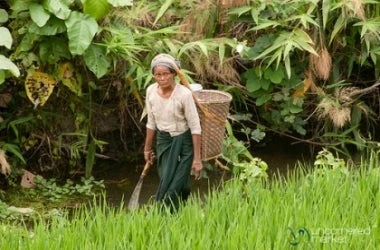When scientists from a broad range of disciplines get together to discuss research to feed the world, while protecting the planet in a changing climate, it’s not surprising that they would call for increased investment. More surprising is that they would agree on setting clear priorities.
The World Bank co-organized the Global Science Conference on Climate-Smart Agriculture in Wageningen, Netherlands, with Wageningen University and The Netherlands Ministry of Economic Affairs, Agriculture and Innovation as part of its efforts to build the store of knowledge that can help small holder farmers around the globe increase productivity – a central theme of the Bank’s Agriculture Action Plan – and build resilience to climate change. The conference will also inform the upcoming global climate change negotiations in Durban, South Africa.
Motivated by the statement of UK Chief Scientific Officer Sir John Beddington that the world is unlikely to make the changes required to limit global warming to 2 degrees centigrade, and is heading for a “4 degree centigrade world with disastrous implications for African food security”, the scientists heeded policy makers’ pleas and delivered some clear evidence-based advice.
Scientists prioritized: “sustainable intensification” − producing more on the same land − with less environmental impact with efficient use of inputs such as fertilizers. They recommended an integrated scientific approach – with a focus on linking knowledge from agriculture, climate change, water, energy and the environment; crop, animals and fish breeding for a 2030 world with a focus on participatory research. Tying all this would be an enhanced understanding of the carbon and green house gas balance and improved risk management. They asked for National policies that would remove obstacles to climate smart agriculture, and stronger science communication. Their advice is outlined in The Wageningen Statement, October 26.
They also called for further funding to support turning research into action.
Speaking at the conference, South African Minister of Agriculture, Forestry and Fisheries, Tina Joemat-Pettersson urged scientists to send clear advice to policy makers about the impact of climate change and the steps needed to ensure food security. She quoted former South African President Nelson Mandela in calling for “a world in which decisions are made on the basis of facts and knowledge, not myths and superstition.”
A theme throughout the three day meeting at Wageninen University in the Netherlands, was the urgency of using the best available scientific knowledge and expertise to benefit small holder farmers and support them in their endeavors to increase productivity and build resilience to climate change.
There was agreement that there is a need to enhance, simplify and harmonize methods to measure and monitor carbon and greenhouse balances.
Lindiwe SIbanda, CEO of FANRPAN, South Africa, argued that agricultural science and innovation is not smart science unless it reaches farmers. Highlighting the importance of getting existing innovative technologies off the shelf and out to the fields − she urged conference participants to make sure they “take it to the farmers.”
Hans Hoogeveen, Director General of the Netherlands Ministry of Economic Affairs, Agriculture and Innovation echoed Ms Sibanda’s advocacy: “Everyday we must ask ourselves how can we get the latest knowledge to farmers, especially women farmers. Research, training and extension services are crucial in this.”
According to Juergen Voegele, World Bank Director of Agriculture and Rural Development, we need the advice of scientists. ”Our focus is on delivering benefits to small holder farmers who can increase productivity through techniques such as agro-forestry, intercropping and better water harvesting, together with breeding drought- and flood-resistant crops. We also want to better understand the potential benefits to farmers from increasing the stock of carbon in the soil. “
Delegates also agreed that a better understanding of gender equity in management of climate smart agriculture is key. As long as women produce more than 50 percent of the food, earn 10 percent of income and own one percent of the land, equity is a long way off.
Climate-smart agriculture will strengthen food security, adaptation and mitigation where farmers use proven techniques such as mulching and inter cropping together and have access to innovative practices such as breeding drought and flood tolerant crops, improved early warning systems and risk insurance.



Join the Conversation